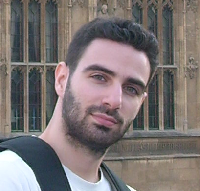Study on polyglots prove they have "different brains" Téma indítója: Katherine Zei
|
|---|
From the BBC:
Polyglots 'have different brains'
People with a gift for other languages could have different brains from those of other people, a study suggests.
Neuroscientists at University College London say they have more "white brain matter" in a part of the brain which processes sound.
Their brains could also be less symmetrical than others.
It is hoped the research, published in the journal Cerebral Cortex, could be used help t... See more From the BBC:
Polyglots 'have different brains'
People with a gift for other languages could have different brains from those of other people, a study suggests.
Neuroscientists at University College London say they have more "white brain matter" in a part of the brain which processes sound.
Their brains could also be less symmetrical than others.
It is hoped the research, published in the journal Cerebral Cortex, could be used help to identify reasons for language difficulties.
Full article:
http://news.bbc.co.uk/1/hi/education/4883418.stm ▲ Collapse
| | | | Fortiter
Local time: 05:06
francia - olasz
+ ...
| I may be an external evidence... | Apr 17, 2006 |
... about the issue raised by the BBC article. In fact I had to be scanned through Magnetic Resonance Imaging and doctors found out little anomalies in my brain: evident asymmetry (as referred in the article) and "a greater volume of white matter in the left auditory region known as Heschl's gyrus" (as reported by BBC).
Just a little difference in their interpretation of those data: my doctors said unfortunately I'm not normal....
Who's right?....
| | | | | different brains | Apr 18, 2006 |
Everybody has a different brain, I don't know anyone who shares, borrows or steals them - yet
Seriously, I am not surprised that they have have discovered some measurable differences, I felt it was only a matter of time. However, as a monoglot with a major lack of the polyglot material and living among users of a different language I often want to thump the brains of my language teachers because they refuse to accept ... See more Everybody has a different brain, I don't know anyone who shares, borrows or steals them - yet
Seriously, I am not surprised that they have have discovered some measurable differences, I felt it was only a matter of time. However, as a monoglot with a major lack of the polyglot material and living among users of a different language I often want to thump the brains of my language teachers because they refuse to accept that I do not learn in the same way as they did. I become incandescently angry when continually presented with material aimed at the culturally limited, learning-by-grammar or learning-by-long word lists.
Trevor ▲ Collapse
| | |
|
|
|
Slavica Kosca 
Horvátország
Local time: 05:06
angol - horvát
+ ...
| Polyglots use their brains in a slightly different manner! | Apr 21, 2006 |
I happen to do a research study on the way the brain works in bilinguals and multilinguals (people with two or three native languages). You may now raise your eybrow and ask how can a person have more than two native languages. In order to explain it, I will say that such a person speaks, for example, three languages with a native-like proficiency. If the parents speak different languages, add a nanny speaking a third language and using it in the everyday communication with the child in question... See more I happen to do a research study on the way the brain works in bilinguals and multilinguals (people with two or three native languages). You may now raise your eybrow and ask how can a person have more than two native languages. In order to explain it, I will say that such a person speaks, for example, three languages with a native-like proficiency. If the parents speak different languages, add a nanny speaking a third language and using it in the everyday communication with the child in question (naturally upon the parents' request) you have a native trilingual (not such a rare case in the 19th century for example in the upper-middle and high class English and American society).
The centers in the brain which have the «task» to adopt new languages hypertrophy due to the multiple number of thickened synapses (nerve beams connecting the two hemispheres) which develop due to the challenge of adopting two or three languages. Hypertrophied are also the speech centres in the left brain hemisphere (Brock's and Wernicke's).
Also, numerous psycholinguistic studies show that bilinguals/multilinguals, unlike monolinguals use the right brain hemisphere, more or less intensely and depending on the circumstances and the age at which they started adopting the 2nd and the 3rd language.
[Edited at 2006-04-26 08:27]
[Edited at 2006-05-02 12:57] ▲ Collapse
| | | | Andrea Russo
Olaszország
Local time: 05:06
angol - olasz
+ ...
| Bilingual brain? | Feb 15, 2012 |
Interesting article. Thanks for sharing!
However the BBC article does not specify anything about the people involved in the trial: for instance, when have these people become bilingual?
Whether we can talk or not about "bilingual brain" has been a hot debate in the last decades among linguists. It has been said, for instance, that aphasias caused by cerebral lesions in the right emisphere (generally an aphasia is caused by a damage in the left emisphere, where language is organised)... See more Interesting article. Thanks for sharing!
However the BBC article does not specify anything about the people involved in the trial: for instance, when have these people become bilingual?
Whether we can talk or not about "bilingual brain" has been a hot debate in the last decades among linguists. It has been said, for instance, that aphasias caused by cerebral lesions in the right emisphere (generally an aphasia is caused by a damage in the left emisphere, where language is organised) are more numerous in bilingual people. Nonetheless, we should be careful because it is a fact that neurologists are more likely to publish strange, uncommon cases rather than ordinary ones. Therefore, we should pay attention at everything we read, especially in such a delicate field. ▲ Collapse
| | | | juvera 
Local time: 04:06
angol - magyar
+ ...
According to the article, the research is based on and concentrated on the recognition/distinction of sounds, and didn’t even mention the reproduction of them, let alone cognition, retention and all the numerous other abilities needed to become bilingual. I think they are bilingual people whose accents – sound reproduction - may not be “perfect” in one or the other language, but apart from that they may be more capable of expressing themselves than others, whose accents blend in more tha... See more According to the article, the research is based on and concentrated on the recognition/distinction of sounds, and didn’t even mention the reproduction of them, let alone cognition, retention and all the numerous other abilities needed to become bilingual. I think they are bilingual people whose accents – sound reproduction - may not be “perfect” in one or the other language, but apart from that they may be more capable of expressing themselves than others, whose accents blend in more than theirs.
I am not disputing their findings regarding the possible differences in people's brains, but their findings could easily be the result of conditioning by the circumstances bilingual people grew up in and developed their language ability. ▲ Collapse
| | | | To report site rules violations or get help, contact a site moderator: You can also contact site staff by submitting a support request » Study on polyglots prove they have "different brains" | CafeTran Espresso | You've never met a CAT tool this clever!
Translate faster & easier, using a sophisticated CAT tool built by a translator / developer.
Accept jobs from clients who use Trados, MemoQ, Wordfast & major CAT tools.
Download and start using CafeTran Espresso -- for free
Buy now! » |
| | Protemos translation business management system | Create your account in minutes, and start working! 3-month trial for agencies, and free for freelancers!
The system lets you keep client/vendor database, with contacts and rates, manage projects and assign jobs to vendors, issue invoices, track payments, store and manage project files, generate business reports on turnover profit per client/manager etc.
More info » |
|
| | | | X Sign in to your ProZ.com account... | | | | | |








